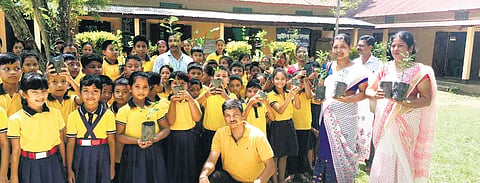

ASSAM: In Assamese, “Biju” means victor, but many people across eastern Assam associate Biju Kumar Sarmah’s name with “beej” (sapling). A teacher at Jyoti Protap Gyanmarg Bidyalay in Jorhat district, he has been sowing seeds of environmental awareness for years by distributing and gifting saplings. His obsession with plants earned him the nickname ‘Gospuli’ (Sapling).
Sarmah served as an honorary wildlife warden from 2014-16. Long before this stint, he traveled miles on his two-wheeler with bags full of saplings for distribution. Motivating people to make their surroundings greener became a habit.
His primary goal has always been the protection of the environment. He says his firsthand experience of environmental degradation turned him into an environmentalist.
“As a child, I saw people catching a lot of fish from a river in my Marijhanji village in Jorhat district. Over time, the fish population dwindled significantly. Everything in nature is interconnected, and I felt the steady loss of forest cover was one of the reasons. So, I started creating awareness among villagers by planting saplings, but I emphasized more on their distribution. I am still doing that,” Sarmah tells this newspaper.
In 2002, he joined the NGO ‘New Gram Seva Sangstha’ and traveled across the state to spread awareness on issues including the environment and health. In 2014, he had to return home when his father fell sick. This made him operate out of the village.
“My father said he would die if I left home. I was torn between my passion and my duty. A bank manager I’ve known for years advised me to carry out my activities from the village. But I wanted to reach as many people as possible, so I formed an NGO called ‘Rengoni, A Hope’. I gathered like-minded people and built a nine-member team to spread our network,” Sarmah recalls.
The NGO began working among people in different areas on environmental issues, collaborating with various state government departments and institutions to organize awareness campaigns.
“Students have been my priority. I have visited hundreds of schools, colleges, and villages in Jorhat, Majuli, Sivasagar, and Kamrup (Metropolitan) districts to spread awareness about environmental protection,” says Sarmah, who has planted over one lakh trees and distributed several lakh more.
He receives saplings for free from the forest department, and his friends and well-wishers also provide them from time to time. Recognizing his efforts, the state government appointed him as an honorary wildlife warden, and he worked closely with the forest department.
“During that tenure, I visited places with forest officials where human-elephant conflict was common. The reason for such conflict is that we have encroached upon the animals’ habitat. It’s a self-created problem. Elephants are attacked when they stray out of the forested area. People need to be educated,” he adds.
Years have passed since his tenure as an honorary wildlife warden expired, but his collaboration with the forest department continues. They occasionally invite him to their official programs.
“If I have to create awareness among children against killing birds, I will take them to a place where there are birds. It helps them to connect,” Sarmah says.
He gives an example of the positive impact of awareness programs, “Earlier, when we planted a sapling by the side of a paddy field, people would remove it, thinking its shade would affect the growth of paddy. After we educated them, they stopped doing this.”
Sarmah says planting trees has twin benefits – it protects the environment and helps people earn a livelihood. Agarwood plants have provided income for many in some Assam districts.
People far and wide know Sarmah as someone passionate about nature and the environment, and he even gifts saplings at social functions. Recently, a college teacher invited him to his wedding and asked him to bring 100 saplings.
“People call me Gospuli. I am happy that the saplings have given me an identity,” Sarmah says, adding, “I get an invite whenever there is an event related to the environment in our area.”